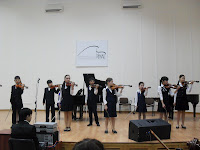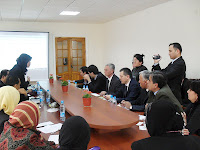Monday, March 26, 2012
My 1st 'Book Chapter' Published in USA

Can Educators Make a Difference?
Experimenting with, and Experiencing,
Democracy in Education
Edited by Paul R. Carr, Lakehead University,
David Zyngier, Monash University and Marc Pruyn, Monash University
A volume in Critical Constructions: Studies on Education and Society Series Editor: Curry Stephenson Malott, West Chester University of Pennsylvania. As the title of this book suggests, how we understand, perceive and experience democracy may have a significant effect on how we actually engage in, and with, democracy. Within the educational context, this is a key concern, and forms the basis of the research presented in this volume within a critical, comparative analysis. The Global Doing Democracy Research Project (GDDRP), which currently has some 70 scholars in over 20 countries examining how educators do democracy, provides the framework in which diverse scholars explore a host of concerns related to democracy and democratic education, including the impact of neoliberalism, political literacy, critical engagement, teaching and learning for and about democracy, social justice, and the meaning of power/power relations within the educational context. Ultimately, the contributors of this book collectively ask: can there be democracy without a critically engaged education, and, importantly, what role do educators play in this context and process? Why many educators in diverse contexts believe that they are unable, dissuaded and/or prevented from doing thick democratic education is problematized in this book but the authors also seek to illustrate that, despite the challenges, barriers and concerns about doing democracy in education, something can, and should, be done to develop, cultivate and ingratiate schools and society with more meaningful democratic practices and processes. This book breaks new ground by using a similar empirical methodology within a number of international contexts to gage the democratic sentiments and actions of educators, which raises a host of questions about epistemology, teacher education, policy development, pedagogy, institutional cultures, conscientization, and the potential for transformational change in education.
CONTENTS:
Acknowledgements.
Foreword:
Reflections on the Global Doing Democracy Research Project,
- Daniel Schugurensky.
Introducing the Global Doing Democracy Research Project: Seeking to Understand the Perspectives, Experiences and Perceptions of Teachers in Relation to Democracy in Education
- David Zyngier and Paul R. Carr.
Democracy, Critical Pedagogy and the Education of Educators.
- Paul R.Carr.
Re-Discovering Democracy: Putting Action (Back) into Active Citizenship and Praxis (Back) into Practice.
- David Zyngier.
Can We Teach Deep Democracy: And Can It Make a Difference?
- Carolyn M. Shields.
Getting Beyond Flat-Out Bored: The Challenges and Possibilities of Creating a Democratic Space for Social Justice Education in Publically Funded Schools.
- Michael O’Sullivan.
Preservice Teachers’ Conceptions of Democratic Essence: Interpretations of Democratic Principles, and Their Connections to Social Justice, Economic Class, and Spirituality/Religion in the United States.
- Thomas A. Lucey.
What Kind of Citizenship for What Kind of Democracy? Are We Spectators of Everyday Events or Protagonists in History?
- Adriana Murriello, Andrea Ledwith, and Cecilia Naddeo.
Teacher Education and Democracy: Preparing Teachers in Metropolitan Buenos Aires.
- María Delia Traverso.
Education for Democracy in Perúvian Society.
- Felix Reátegui and Susana Frisancho.
Doing Democracy in Education: Perspectives of Malaysian Principals.
- Sazali Yusoff.
“Critical Multicultural Social Studies” for “Thick Democracy”: Theory and Practice.
- Marc Pruyn.
IAP - Information Age Publishing, PO Box 79049, Charlotte, NC 28271, USA
tel: 704-752-9125 fax: 704-752-9113 URL: www.infoagepub.com
Publication Date: 2012
ISBNs:
Paperback: 978-1-61735-813-5
Hardcover: 978-1-61735-814-2
E-Book: 978-1-61735-815-9
Price:
Paperback: $45.99
Hardcover: $85.99
Friday, March 23, 2012
Professional Visit to Uzbekistan - Tashkent
7 March 2012 (Wednesday) - Tashkent




Our first visit today was to music school which is known as Republican Specialised Academic Lyceum of Music named after V. Uspenskiy. The
curriculum of the school is geared toward producing world class
musicians and artists. Only talented students were succeeded to enrol
in this school by rigorous screening and talent testing.


Our final official visit was a meeting with the management of the
Central in-Service and Retraining Institute of Public Education Staff named after Abdulla Avloniy. The meeting was led by the institute Rector, Mr. Maqsdujan A. Yuldashev and Dr. Zainab on behalf of IAB. Basically, the establishment of this institute is almost similar with IAB vis-a-vis its functions.
Professional Visit to Uzbekistan - Tashkent
6 March 2012 (Tuesday) - Tashkent
Four of us together with H.E. Aziz Harun, the Ambassador were
Four of us together with H.E. Aziz Harun, the Ambassador were
called for a short meeting with Deputy Minister of
Public Education at the Ministry of Public Education Office.





The Deputy Minister expressed his interest of cooperating
with Malaysia particularly in the area of ICT in education.
L-R : Me, H.E. Aziz Harun, Deputy Minister, Dr. Zainab (Deputy Director of IAB), Nazhatul Shima, Dr. Shahri

Receiving a token of gift from Deputy Minister
Later of the day the delegation went to School No. 28 Tashkent.

Here we were allowed to see classroom in action. Toward the end
of the visit we were briefed by the school principal on the
school management particularly on curriculum and student affairs.

Monday, March 19, 2012
Professional Visit to Uzbekistan - Tashkent
 5 March 2012 - Monday
5 March 2012 - MondayA courtesy visit to Malaysian Embassy in Tashkent. His Excellency the Ambassador Aziz Harun briefed us on Uzbekistan and it's relationship with Malaysia in many aspects of cooperation.
He elaborated at length about the Uzbekistan's government, administration, economy and social system.
After spending about 2 hours at the embassy we went to Tashkent
State Pedagogical University.

Group photo at Malaysian Embassy, Tashkent.

Briefing given by University Rector on Uzbekistan's System of Education particularly on tertiary education.

Professional Visit to Uzbekistan - Samarkand
 3 March 2012
3 March 2012Visit to Samarkhand Region Institute of Upgrading Qualification and Retraining of Pedagogical Cadres. It was established in 1944. The main function of this institute is giving training to in-service teachers either to upgrade their qualification or for their continuous development in the field of pedagogy.
L-R: Rector (Mr. Azamat Kurahmedov), me, Deputy Rector

Sharing of information between Institute's Management with Malaysian delegation
A group photo : IAB and SRIUQRPC
Professional Visit to Uzbekistan - Bukhara

1 Mac 2012 (Thursday)
Visited School No. 2 Bukhara. We were ushered by the Principal and teachers. Along the aisle to the meeting room, a number of students were stationed to explained to us on the poster/photo besides th
 em. In the meeting room, a short briefing was given by the school principal and followed by the the school choir performance.
em. In the meeting room, a short briefing was given by the school principal and followed by the the school choir performance.The unique of this school is it provides a special room for sick students with full time nurse looking after them.
The Uzbekistan system of schooling is a compulsory 9 years of schooling in the same compound whereby Year 1 to Year 4 is a primary education and Year 5 to Year 9 is secondary education administered under one roof by a principal


Subscribe to:
Posts (Atom)
